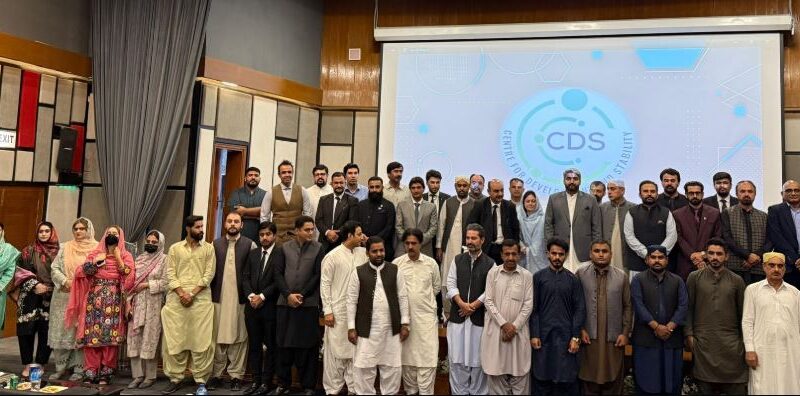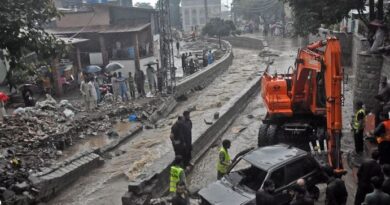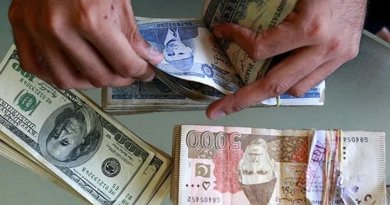Speakers stress national development, strategic vision
Staff Report
QUETTA: Speakers at a seminar emphasized national development, collective ownership, and strategic vision, youth empowerment and women’s participation to governance reforms for a prosperous, united, and stable Pakistan, beginning with Balochistan.
The Centre for Development and Stability (CDS) organized a seminar titled “China-Pakistan Economic Corridor: Regional Connectivity, Innovation, and Security in Balochistan”. The event brought together policymakers, scholars, tribal leaders, youth activists, and development professionals to discuss the multifaceted impact of CPEC on Balochistan, said a news release.
Maimona Saleem shared her analysis on Women Empowerment through CPEC in Balochistan. She emphasized that while CPEC is primarily a bilateral trade and infrastructure initiative, it also presents an opportunity for women’s economic participation.
Women’s empowerment, rooted in self-efficacy and entrepreneurial support must be purposefully integrated into industrial planning. She recommended that CPEC developers, in consultation with gender experts and business advisors, should design industrial zones with dedicated resources and support services for women-led businesses.
Dr. Irfan Ashraf, Director General CDS, presented a Comprehensive Analysis of the CPEC Project, highlighting how China-Pakistan collaboration benefits all of Pakistan with a particular focus on Balochistan. He cited initiatives such as the provision of 10,000 solar lighting systems and the establishment of an emergency medical center in Quetta. He also mentioned the distribution of 50,000 health kits across 620 schools, completion of Gawader Airport, which reflects China’s continued support for the province.
Sardar Haroon Khan Jamali, Chief of the Jamali Tribe, discussed the strategic and developmental prospects of Usta Muhammad District. Despite being a newly created district with initial disadvantages, he noted that its youth are eager for progress and change, given its strategic location and emerging human capital.
Mr. Hafeez Ullah Jamote, Founder of Jamote Youth Balochistan, emphasized Youth Empowerment. He underscored the vision of his organization to cultivate skilled, aware, and patriotic youth. He made a heartfelt appeal for inclusive development through scholarships, employment, and representation, while reaffirming loyalty to Pakistan’s armed forces and national institutions.
Raja Faisal, a senior geopolitical analyst, discussed The Role of Hostile Powers in Destabilizing Balochistan, particularly India’s hybrid warfare tactics aimed at sabotaging CPEC. He asserted that unity, faith, and discipline are essential to counter external threats and ensure national development.
Former Caretaker Chief Minister of Balochistan, Alla Uddin Marri, highlighted the lack of basic amenities in Balochistan and questioned how the region can fully benefit from high-end technologies without foundational infrastructure. He urged strategic focus to maximize CPEC’s benefits.
Advocate Mir Atta Ullah Langove, President of Balochistan High Court, remarked that CPEC should be an enabler of local development. He stressed that the lack of resources should not turn communities against Pakistan or the project itself.
Babar Khajjak, a youth activist and politician, criticized poor governance as a major hurdle in Balochistan’s ability to benefit from CPEC. He advocated for educational reforms, scholarship opportunities, and establishment of standard schools.
Dr. Dost Barreech, Lecturer of International Relations at the University of Balochistan, spoke about the Geoeconomic Potential of Balochistan under CPEC. He emphasized the province’s untapped resources, ranging from minerals and agriculture to tourism and the blue economy. He warned that Balochistan’s growing grievances must be addressed and called for a geoeconomic lens in national planning.
Speakers concluded by advocating for realism and pragmatism in approaching the CPEC project.
Speakers thanked CDS for organizing a timely and relevant dialogue on CPEC and Balochistan.
This seminar served as a vital platform to bring diverse voices together for a constructive discussion on the future of Balochistan within the framework of CPEC.
From youth empowerment and women’s participation to governance reforms and strategic vision, the seminar highlighted that inclusive development is key to unlocking the true potential of this transformative project. Let us work together for a prosperous, united, and stable Pakistan, beginning with Balochistan.



